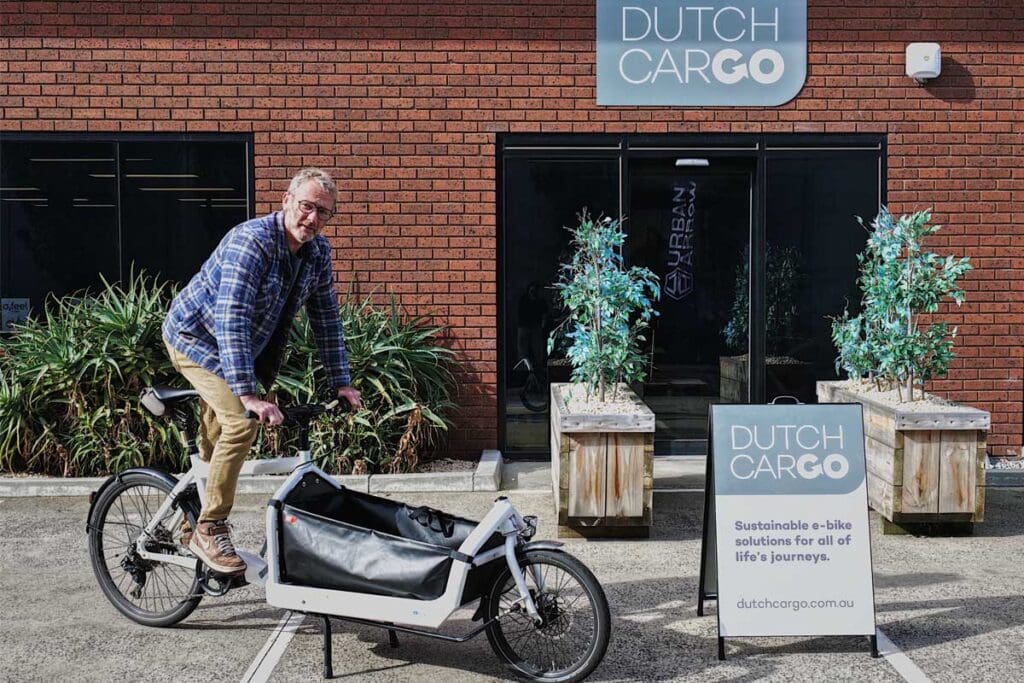Restored Partnership a Silver Bullitt for Cargo Conversion

Melbourne, Victoria
While bicycle companies around the globe are looking down the barrel of a testing economic climate for the next few months at least, one Melbourne business has turned to a Bullitt as a solution.
E-Cargo and commuter e-bike specialist Dutch Cargo last week signed as a distributor for Bullitt, a lightweight, front-loading cargo bike produced by cult Danish brand Harry v Larry.
The partnership turns back the clock for Dutch Cargo, which was also a distributor for Harry v Larry from 2012 to 2015, as well as stocking Bullitts in its Melbourne showroom.
The brand switched to another distributor in 2015, PS Bikes, before that company folded only months later.
Dutch Cargo continued to sell Harry v Larry bikes as a retailer and co-owner Jurgen Heikamp said now seemed the right time to resume the role of distributor, as rising cost of living pressures and greater urgency in the climate crisis prompted more people to consider cargo bikes as a transport option.
While some bike industry members believe the climbing cost of living has contributed to plummeting bike sales numbers in recent months, Jurgen says some clever promotion could turn the economic pressures into a positive for the e-bike sector.
Instead of viewing bike purchases as a luxury to forgo when household budgets tighten, cargo and e-bike need to be promoted more as a solution to economic stress for families.
“To many Australians, bikes are still for sport, rather than transport but the financial argument is going to be the biggest driver for people to consider swapping their second car for a bike.
“It’s an opportunity to grow what is still a fledgling cargo bike market in this country.”
He said there’s never been a better time to promote the benefits of families selling their second car.
“There’s 2.7 million second car owners in Australia, which is a big market, and there must be a lot of them who only drive their car for one or two thousand kilometres a year around their neighbourhood,” he added.
“When it’s costing them $10,000 to $12,000 per year to drive that car a limited number of kilometres, the idea of trading that car in and buying a quality e-bike or cargo bike can be pretty appealing.
“And once they start riding it, they save $10,000 a year by not having the car.”
High-Performance Cargo
Jurgen said Harry v Larry has carved its own niche in the cargo sector, creating light and nimble bikes with an emphasis on performance.
“They are the lightest cargo bikes on the market and their riding position is more like a mountain bike or a road bike,” he said.
“A lot of the front-loading bikes, like Urban Arrow or Bakfiets have more upright riding positions, while the geometry of the Bullitt puts the rider further forward and over the handlebars.
“It makes Bullitts very popular with road bike riders in other countries and it’s a more typical riding position for many Australians.”
He said that high-performance focus was further enhanced in the Bullitt’s electric models by the bikes’ Shimano EP8 motor.
“With many pedal assist e-cargo bikes, you can’t really pedal the bike any faster than the 25kmh limit for assistance,” he said.
“Even though Bullitt e-cargo bikes also stop assisting you at 25kmh, the internal resistance of the Shimano motor allows you to easily keep pedalling up to 30 or 35kmh.”
Exploring Sales Alternatives
Jurgen said as Dutch Cargo begins the process of building a network of Bullitt retailers throughout Australia, his company is looking at additional measures to reach consumers.
He said with sales levels down across the industry and many store owners strapped for cashflow, Dutch Cargo is looking at opportunities for partner shops to act as agents for Harry v Larry without the need to stock them on the floor.
“We’re working with them, through their networks of clientele and mailing lists, to promote a selection of our e-bike range and earn a commission for any sales,” he said.
“The bike will be built up in their shop and it gives them an entry point to the world of cargo, without requiring them to make an initial investment and buy a certain number of bikes.
“Flexibility and innovation will be key in the current state of the industry and this approach helps solve another challenge in getting front-loading cargo bikes out into the market.”
Jurgen said the larger footprint of front-loading cargo bikes compared to other bike categories – including many rear-loading cargo models – meant stores often struggled to allocate space for them in their displays.
“We will be looking at solutions for that, such as the potential for more test centres across Australia and other retail channels,” he said.
